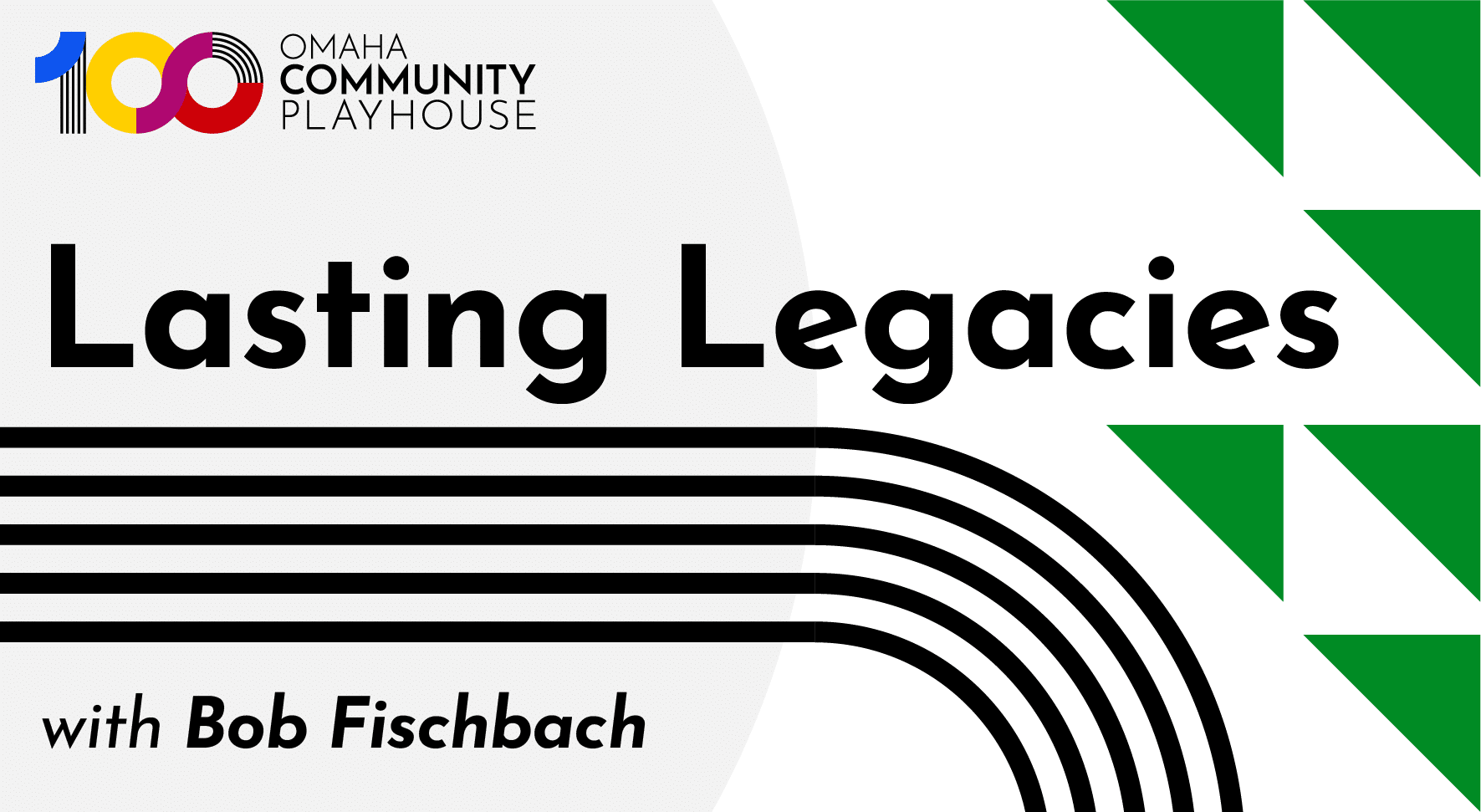
The Omaha Community Playhouse stage door is named after Carl Beck and Susan (Susie) Baer Collins. When they first arrived here in 1978, neither imagined the four decades of entrances, exits and accolades that would follow.
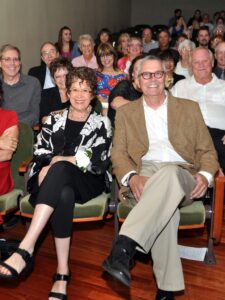
Susan Baer Collins & Carl Beck
Both started as acting phenoms. Both toured with OCP’s professional arm, the Nebraska Theatre Caravan. But their greatest accomplishment was becoming the kind of stage director actors love — the kind that makes them better actors.
Carl and Susie’s path to their stage door and Playhouse leadership starts in, of all places, a soggy tent. It was July 1975. Charles Jones, the Playhouse’s new chief executive, was bereft. A May tornado had ripped the roof off his theatre. Come to Norfolk, friends said. Nebraska Rep is doing a Chautauqua-style tent show for the Bicentennial. It will cheer you up. Jones went. It poured rain. But an actress made him forget his wet socks. Susan Baer’s tour de force in David Bell’s Portraits took her character from age 16 to 70. (She was 24.) Jones set his sights on hiring her. Bad timing. Susie had met Carl in Lincoln’s Nebraska Rep in 1972. The two fell in love and married between gigs as they tried to establish acting careers. For six years, they bounced from Kansas City to New York City, Lincoln to Virginia and back again.
Beck, son of a Shreveport, La., geologist, had earned a theatre degree from the University of Tulsa. Collins, born in Detroit to a Veterans Administration doctor, had moved with her family to Lincoln as a teen. She interrupted her acting studies at the University of Nebraska to hit the road.
By 1978, they were in Atlanta, and hungry. Jones reached out to both. “I said, ‘You’re waiting tables, I’m working in a box office. What are we doing here?’” Beck remembered. “We hot-footed it to Omaha.”
They appeared in scores of Midwestern towns with OCP’s seasonal Caravan. Then they went to work for Ted Turner’s fledgling TBS television in Atlanta, creating children’s programming. As Jones expanded the Caravan tours and the Playhouse itself, he needed more full-time staff. He added Carl in 1983 and Susie in 1987, settling them in Omaha with young son Ben.
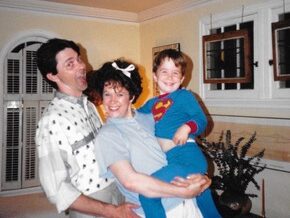
Carl, Susie and Ben
Their Playhouse start was humble. “The place was bursting at the seams,” Beck said. “It was very bare-bones. Charles existed on very little sleep. For a long time, I worked at a card table in the basement. But we loved the Caravan, the talent it brought to the Playhouse.”
That included Carl and Susie. They acted, wrote scripts and got their directing feet wet with the Caravan. From the start, their directing styles differed. “Carl was, a lot of the time, by the seat of the pants,” said costumer Denise Ervin. “Susie studies everything, is very put together before you even start. She knows what she wants. Both were such amazing actors; they brought that perspective as well.”
Susie prepared with extensive historical research, analyzing the script’s emotional beats, shaping rehearsals to nurture and challenge actors. Carl worked on instinct, discovering along the way, listening for false notes, giving actors room and nudging them if they went astray.
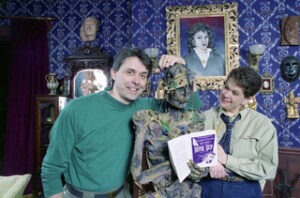
Carl and Susie from The Mystery of Irma Vep (1990-91)
While most saw Beck as a master of farce, physical bits and comedic timing, actor-director Jim McKain saw more. “The big tap musicals, that was Carl,” McKain said. “He could bring fun to that environment, and that translates out there on the stage. He brought that farce-like aesthetic to those big musicals such as Crazy for You and Will Rogers Follies.
Collins’ forte was heart-tugging musicals including Ragtime, The Secret Garden and Carousel, music director Jim Boggess said.
A versatile pair, both helmed strong dramas as well. And sometimes they co-directed, as with the smash sellout of Les Misérables in 2014.
Collins, McKain said, has “about as deep a desire for authenticity as I’ve ever encountered in a director. She has that gift to speak to actors in their own language,” whether they’re green or experienced. Actor Cork Ramer, like McKain, a recipient of OCP’s top acting award, agreed. “If any actor, at any level, gets a chance to work with Carl or Susie, do it. You’ll come out of that rehearsal process a better actor than you ever thought you could be.“
They were a true team, whose gifts complemented one another. Some say Jones directed with his eye, Beck with his ear and Collins with her heart.
A 1991 stroke left Jones in declining health, and in 1997 he left OCP. Having proven themselves as directors by then, Carl and Susie took the artistic reins. For 17 years, they were Playhouse artistic director and associate director.
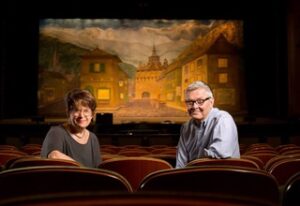
Susie and Carl (2014)
In all, Carl has directed 117 OCP and Caravan shows, and Susie over 100. Each also co-directed more than 100 casts of Jones’ iconic adaptation of Dickens’ A Christmas Carol, both for Omaha and for Caravan tours — up to four casts per year.
Their strong working partnership overcame huge challenges. Though their marriage ended in 1996, they kept side-by-side OCP offices and raised Ben. Years later, Susie married Dennis Collins. Carl cast Dennis in his shows, and the three even vacation together. The friendship endures.
When Beck was asked to resign in a 2009 budget-cutting move, Collins turned down his job and resigned as well. The theatre community rallied around them, and money was found to reinstate them. They chose to retire in 2014.
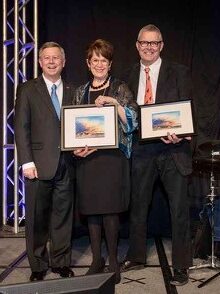
Susie and Carl receiving the Governor’s arts award.
Three times Susie came out of retirement to serve as interim artistic director while new OCP leadership was chosen. Three times Carl returned from Florida to help Susie show new directors the secrets to mounting A Christmas Carol.
Because they love the place that much.
“It was a daunting challenge to sustain what Charles Jones created,” actor Paul Tranisi said, who recently passed away this year. “Carl and Susie understood the value of the Playhouse’s quality standards and were prepared to help perpetuate those.”
Through it all, Beck and Collins never considered leaving. “We liked Omaha, our kid was settled. We certainly had great friends,” Beck said. “It was a huge full plate, and you were working with all cylinders to keep up with it. You certainly didn’t feel you’d outgrown it.”
Collins agreed. “It wasn’t that I was hired to direct a play. I was hired to direct seasons. We had a family; I was working a job that people in my world would kill for. We considered ourselves very fortunate.”
Lasting Legacies with Bob Fischbach
As part of our centennial celebration, OCP will share monthly feature-length articles by OCP board of trustees’ member Bob Fischbach that salute key individuals and patrons who made a lasting difference in the legacy of the Playhouse’s first 100 years.
Notifications